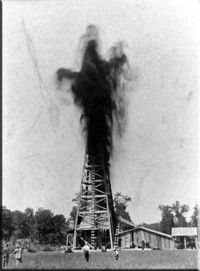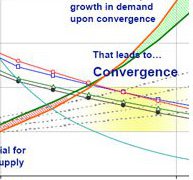When oil was dear, and thought to be rare, the industry was more than happy to cozy up to the renewable fuels industry.
At the height of the Iraq War George W. Bush pushed through a $1.2 billion plan aimed at making hydrogen as cheap as gasoline. Exxon, Chevron and Shell all backed renewable fuel projects, mainly involving biofuels.
President Obama’s program for renewable energy, including the SunShot program that produced Solyndra, passed with bipartisan support, and states fell all over themselves to introduce renewable fuel standards, mandating that solar and wind power go into the grid.
What happened?

And there’s shale everywhere. Not just in the usual places – the Bakken, the Permian, and the Eagle Ford. There are a host of other shale plays yet to be developed – the Niobara, the Mississippian, and the Haynesville. Most of these are brand new fields, but the Permian has been pumping oil for going on 80 years now, and it’s the richest shale play of all. How much you want to bet Saudi Arabia can be fracked? God knows Iran probably can be.
If any rock can be fracked, then what determines profit is cost and competition. U.S. shale operators think they can live on $60 oil, and make good money at $70. That’s the equilibrium point West Texas Intermediate is heading toward, although if the speculators can get it higher they will.

Oil is starting to lose international markets. If you don’t have sophisticated infrastructure – Africa doesn’t, Asia doesn’t – then solar energy is the cheapest power there is. Africa is lifting itself out of poverty thanks to the combination of solar power and cellular network service. Panels can power the phones and the towers, service brings the most remote village within reach of markets, and the power of markets leads to political stability. No, it’s not like the West, but if you have a roof over your head, food on the table, and if your kids have hope you’re in the global middle class, and more have been lifted into that category this century than ever before, more than 1 billion people.

They’re reacting as though their very lives depend on it. Republican state legislators suddenly can’t do enough to kick renewable energy in the ass. Those renewable energy standards? Out! Aid to wind farms in Texas? Gone! Solyndra, Solyndra, Solyndra. (Never mind that the program itself made money, unlike Bush’s hydrogen effort.)
How much of a threat is this? In the long run, it’s not one. Economics will beat politics every time. Business has driven the political train since the days of Alexander Hamilton, and it always will. Technology interests are already expressing some alarm over the sudden turn of events, with companies like Apple loudly doubling-down on their solar energy investments. New technology continues to come out of labs that drives costs below the 40 cent/watt level considered directly competitive with natural gas. Public support for solar is firm, and some Tea Party groups are actually rebelling against their corporate masters.
In the near term, however, oil industry money can tip the balance in the 2016 elections if the tech industry doesn’t get its act together, seeing the urgency of the threat. What does oil have waiting for us if it takes power again? Just what it gave us before – four more wars, royalist economics, and decadent lifestyles hiding behind rigid social policies.
We could be looking at another wasted decade, and the Earth can’t handle that. We need to act now. European countries, which have less oil and have never been beholden to oil interests, are now beginning to divide from the U.S. diplomatically over just this issue. They’re asking, what’s the matter with the U.S.? Why are they denying the reality of science, the reality of climate change, even while their cities drown?
What America needs in 2016 is an economic and foreign policy that works to get us out of war by divorcing our economy from the oil produced by countries like Saudi Arabia and Iran and Iraq. Let them pound sand and work things out for themselves. I’m not sending my kids into that furnace, yet that’s what these bastards are threatening to do. Just ask them a foreign policy question if you don’t believe me.

We need a whole new generation of young people willing to go into public service for the right reasons. It’s time for millennials to step up to the plate. Will they?
All of which makes 2015 the summer of our discontent. It should not be – the economy is moving, we just went through the first Memorial Day in 14 without our troops fighting a war somewhere, social progress is everywhere.
But complacency can be deadly to a political movement. You only win with a call to arms. Who will give it? And who will answer?
Stay tuned.








